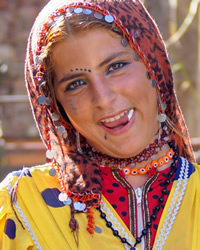The Romani people are often misunderstood. They have been called “Gypsies” because people thought they were from Egypt. That term has become derogatory. Romani call themselves Rom, which in their language means "men." Rom is derived from the Indian word Dom, meaning "a man of low caste who gains his livelihood by singing and dancing." They could also be metal workers. In India, they were discriminated against and excluded from the temples. Later, they were sent to Persia as minstrels. From there, they were separated into two groups. One traveled northward and became the Romany-speaking European Romani. The other traveled southward and became known as the Domari or Middle Eastern Romani. Through time they developed numerous dialects.
As the name suggests, Balkan Romani speakers are mainly in the Balkan nations. This dialect uses grammar from the Turkish language. Like other Romani languages, it has some influences from Greek. There are smaller populations in different parts of Europe and even as far as Algeria. One of their countries is Germany. In that country, they are greatly outnumbered by the Sinte Romani.
People often assume that all Romani have dark hair, complexion, and eyes; however, Balkan Romani sometimes have lighter skin and even blond hair and blue eyes. This is probably because their ancestors mixed with Europeans. Unlike the Romani who have remained in India, many Balkan Romani are settled.
Unlike the Romani who have remained in India, most Balkan Romani have become settled. They often live in villages or near towns and cities. In France, they often live in slum-like conditions. Some still travel by caravans of cars, trucks and trailers.
In the past, the Romani were not allowed to own land, so they began developing unique occupations which they still do today. These included fortune-telling. They are especially known for their musical abilities and dancing. Many sing and play instruments at weddings, baptisms and festivals. Unfortunately, they are also known as beggars and thieves. This reputation has caused much discrimination against them. In many countries, they are last in line for jobs. Some women work as domestic helpers but are paid low wages and given no health benefits. Many have insufficient housing and unsatisfactory medical attention.
Their unique lifestyle and appearance separate them from non-Romani. They work with skill but come across as eccentric and different. All of these things make Balkan Romani interesting and mystical. There have been times when they have been deported from France. Often Balkan Romani children are excluded from French schools.
Balkan Romani marriages are sometimes arranged by parents, and young couples usually marry while in their mid to late teens. Often, they prefer to elope rather than to have a wedding ceremony. They value purity before marriage, especially for women.
Wherever they live, the Romani people adopt the local religion. In France, this means adopting Roman Catholicism. Beneath the surface of organized religion, they sometimes maintain their religious traditions and beliefs. Some believe that ghosts, lizards and snakes are capable of harming humans. People have the power to curse others by giving them the "evil eye." Others have come to true repentance in Christ, and they are following him.
Although they may be more sanitary, better educated, and have more opportunities than Romani in the Middle East and India, they all have one thing in common: the need for Jesus. Christ's followers can be Christ-bearers to these rejected people. It will take people who are willing to take risks for the Lord.
Pray that Balkan Romani people will find love and acceptance through Christ, leading them to give him all their dedication.
Pray for a heartfelt dedication to Jesus Christ that will rise high above traditional beliefs.
Ask the Lord to raise up loving and dedicated people who are willing to share Christ with the Romani.
Pray that soon there will be a movement of Balkan Romani discipling others, spreading the fragrance of Christ everywhere.
Scripture Prayers for the Romani, Balkan in France.
https://en.wikipedia.org/wiki/Balkan_Romani
https://www.endangeredlanguages.com/lang/5342
https://www.livescience.com/25294-origin-romani-people.html
https://en.wikipedia.org/wiki/Romani_people_in_France
https://en.wikipedia.org/wiki/Deportation_of_Roma_migrants_from_France
| Profile Source: Joshua Project |














